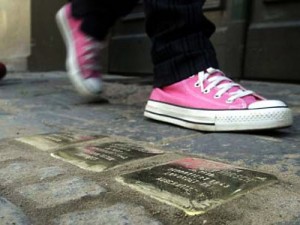I’m blogging through Richard Rohr’s Falling Upward: A Spirituality Through The Two Halves Of Life. Even if you haven’t read the book, please stick around and join the conversation here if you’re facing a mid-life transition. Father Rohr offers us all some meaty food for thought.
Here are links to my previous posts in the series: Intro — Chapter 1 — Chapter 2 — Chapter 3 —Chapter 4
* * * * * * *
 We now`round the bend into Chapter 5, entitled ‘Stumbling Over The Stumbling Stone’. “Sooner or later,” Father Rohr writes, ” if you are any classic ‘spiritual schedule’, some event, person, death, idea, or relationship will enter your life that you simply cannot deal with, using your present skill set, your acquired knowledge, or your strong willpower.” We have to come to this painful point in order to be open to change. Otherwise, we would have no reason to leave the proverbial comfort zone.
We now`round the bend into Chapter 5, entitled ‘Stumbling Over The Stumbling Stone’. “Sooner or later,” Father Rohr writes, ” if you are any classic ‘spiritual schedule’, some event, person, death, idea, or relationship will enter your life that you simply cannot deal with, using your present skill set, your acquired knowledge, or your strong willpower.” We have to come to this painful point in order to be open to change. Otherwise, we would have no reason to leave the proverbial comfort zone.
The paradox is that we can’t simply generate this as an item on our own spiritual agenda. “Any attempt to engineer or plan your own enlightenment is doomed to failure because it will be ego driven,” Rohr notes. The best we should expect from someone else’s prepackaged growth plan is a greater attentiveness to what’s happening in our own lives. If anything more than that is promised by a spiritual leader, it’s a case of overselling on their part.
“We must stumble and fall, I am sorry to say. And that does not mean reading about falling, as you doing here.”
If we are honest, there are some things in our lives that can not be fixed. Rohr calls the cross a dramatic symbol of “that necessary and absurd stumbling stone”. I would disagree here. The cross is not metaphor. It is cure. “Many Christians even made the cross into a mechanical ‘substitutionary atonement theory’ to fit into their quid pro quo worldview, instead of suffering its inherent tragedy, as Jesus did himself.” In this, Rohr is correct. It is impossible to know the comfort of One who suffers with us if our experience of God is limited to cognitive affirmation of a set of theological words about him.
“The cross solved our problem by first revealing our real problem – our universal pattern of scapegoating and sacrificing others. The cross exposes forever the ‘scene of our crime’… Jesus must be crucified, or there can be no resurrection. It is written in our hardwiring, but can only be heard at the soul level. It will usually be resisted and opposed at the ego level.”
Rohr points at the testimonies of recovering addicts who end up thanking God for their former lives because it took every bit of it to “break down their false self and open them to love”. In contrast, he notes that many of the poorly-parented inmates he served during his years as a jail chaplain had no sense of boundaries, identity or inherent awareness of their own dignity, and destroyed themselves and others as a result. Though some are broken by jail and find new life, most others are so wounded that they can do nothing more than hold onto their broken false self like a life preserver.
If we don’t do the container-forming task of first half of our lives well, when the stumble comes (and it will), we will not be able to rise and move forward. Those who have never experienced this fall are often the ones who have benefited from soft circumstances and their ability to stand on the necks of others to arrive at their position of power. He notes that many of the slaveholders of the South were these “self-made men”. A refusal to fall, or perhaps a fear of falling has rendered them spiritually impotent, keeping them “from awareness, empathy, and even basic human compassion”, gaining the world but losing their souls in the process.
A couple of years ago before the gears got stripped from my right shoulder, I was a part-time caregiver and worked for months in the homes of two different, extremely wealthy older clients. One was generous, gentle and treated me with respect. The other was imperious and demanding, and treated me as though as I was a dumb grunt. I learned a lot from serving each of them. Each needed some assistance with the tasks of daily living. The generous woman had come to terms with her diminished physical capabilities, and was grateful for my assistance and companionship. I was grateful to get to know her as well.
The other had lived a privileged North Shore life – country club memberships, household “help” in the form of maids, gardeners and the like. I learned that she was confident that treating her help as though they had the value of 3/5ths of a person was morally acceptable. Her life of comfortable entitlement had buffered her from the pain of a flat-on-the-face stumble for 9 decades of life, though she was stumbling a bit with issues related to her aging when I came onto the scene. Perhaps her epic bossiness had something to do with her loss of some control in her life, but I think in her case it was more of a lifelong habit, unchecked by the kind of stumble that redirects us away from our fabulous selves and toward our cure.
Stumbling really is a necessary step, isn’t it?











